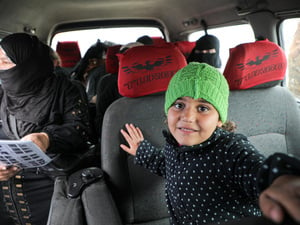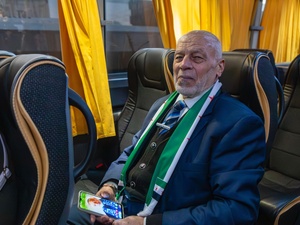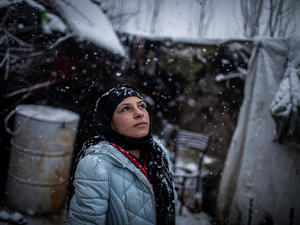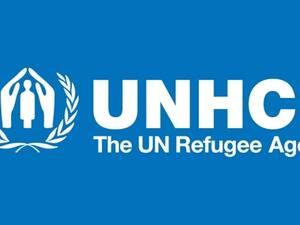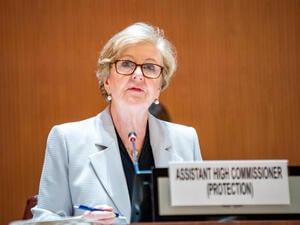Syrians risk all to flee Raqqa, as new aid route offers hope
Syrians risk all to flee Raqqa, as new aid route offers hope

A Syrian displaced family sits in a tent in Ein Issa camp after they fled the besieged city of Raqqa in northern Syria.
MABROUKA CAMP, Syria – As the battle for the northern Syrian city of Raqqa raged around her, 30-year-old Fatima described the moment that fighters from the armed group still controlling most of the city came to her house and ordered her to leave.
“They treated us like cattle. They evicted us from our homes, telling us to leave or be killed,” she said, adding that the armed group intended to use her and her neighbours as human shields. “They wanted to move all of us to the local dam, but we turned around and fled.”
Fatima ultimately managed to reach Mabrouka camp, some 150 kilometres northeast of Raqqa city in Syria’s Hasakeh governorate, which is currently home to some 1,700 displaced Syrians.
Despite reaching safety, she is still haunted by memories of the dangerous journey, which she took despite knowing that those caught trying to flee risked being shot.
“They treated us like cattle. They evicted us from our homes, telling us to leave or be killed.”
“We left all of our belongings behind and walked for 12 hours straight. We saw mines and goats that had been blown up all along the route, so we stuck to walking on the asphalt road,” Fatima said.
Her experience echoes other accounts received by UNHCR, the UN Refugee Agency, of civilians being forcibly evicted from their homes, and chilling reports of killings or attacks on those attempting to reach safety.
“Many are in the unimaginable position of having to decide between taking cover as fighting continues to rage, or taking their chances and running – risking death for themselves and their families either way,” UNHCR spokesperson Andrej Mahecic told a news briefing in Geneva on Tuesday (July 11).
“This is an affront to our common humanity and we remind all parties of their obligations to abide by international humanitarian law. Civilians must never become targets,” Mahecic added.
Since the beginning of April, more than 190,000 people have been displaced either from or within Ar-Raqqa governorate by fighting. Those fleeing have sought shelter in multiple locations, including Mabrouka and several other camps, where UNHCR and its partners are providing families with shelter and much-needed emergency relief items.
In the past fortnight, UNHCR has successfully completed a series of humanitarian convoys by road from Aleppo to Qamishli in Hasakeh governorate. This strategic land route had previously been closed for nearly two years due to fierce conflict in the area, and its reopening is already making a notable difference to the availability of aid on the ground.
"We remind all parties of their obligations to abide by international humanitarian law."
Regular deliveries along the new route are planned from warehouses in Damascus, Homs and Aleppo, allowing UNHCR and other UN agencies and partners to reach a greater number of the estimated 430,000 people in need of assistance in Ar-Raqqa governorate.
In Ein Issa camp, located some 45 kilometres north of Raqqa city and currently home to around 7,300 people, 45-year-old Badrieyeh said the decision to flee his hometown near Raqqa had ultimately paid off.
“We spent two days on the road, sleeping under the trees. Thank God, at least here in the camp we have a tent to sleep in and blankets to cover our children,” he said.
However, the situation remains bleak for the 30,000 to 50,000 people that the UN estimates remain trapped inside Raqqa city. Availability of food, water, medicine, electricity and other essentials has been dwindling, with the situation rapidly deteriorating.
UNHCR stresses that it is imperative that trapped civilians are able to secure safe passage out – to reach safety, shelter, and protection.


